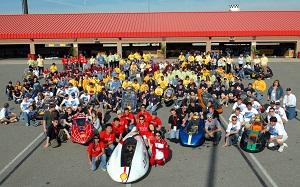Students to race for fuel efficiency in Shell's Eco-marathon
 Students from high schools and universities across the globe will use solar power and other innovative technologies to compete for the most fuel-efficient vehicle at the Shell Eco-marathon in Houston, Texas, this weekend.
Students from high schools and universities across the globe will use solar power and other innovative technologies to compete for the most fuel-efficient vehicle at the Shell Eco-marathon in Houston, Texas, this weekend.
Students broke the record for efficiency at the first ever Eco-marathon in 1939 when they drove a car 50 miles on a gallon of gasoline.
Last year’s winner drove the equivalent of 2,564 miles per gallon.
The race has two classes—one for prototype cars that are designed to be as efficient and fast-moving as possible and another for urban cars. Urban cars are designed to be functional and operate much like modern cars today but with wildly outrageous fuel efficiencies.
The event has nearly doubled in size since last year when competition featured just 70 teams. There are 136 scheduled to race through the streets of Houston this weekend.
The Alerion Supermilage team from Universite Laval in Quebec City, Canada, has taken first place three consecutive years.
Purdue University in Indiana was the only team to race a solar-powered car in the urban class in 2011 and will do it again this year. The team has been building solar-powered vehicles for special races like this one for the past 20 years.
But the 2011 race was the first time Purdue Solar Racing attempted to build a solar-powered vehicle that looks like a normal car today and featured street-worthy urban design elements like headlights, solid suspension for bumps in the average road, cruise control and dash displays.
“We wanted to do something kind of different with our entry,” said 2011 team president Ted Pesyna. “The concept was to design a solar vehicle that’s not only efficient but something we could also take to the next level, something that people can look at and see it taking them to the grocery store.”
The team will race the same vehicle this year, according to a blog entry about the race.
“To prepare we have armored Celeritas with a wide range of improvements and changes,” team secretary Rachel Bodien writes. “This includes changes to our motor, suspension systems, and electrical systems.”
She said the team is also working on its next generation solar vehicle, the Navitas.
“The team is using all the knowledge and experience gained from Celeritas to make an even better urban concept vehicle that we hope to bring to Shell Eco Marathon in the next year or two,” Bodien writes.



